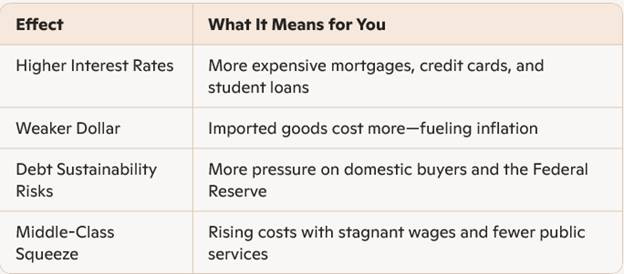💸 Explainer: How Foreign Investment Keeps America’s Economy Afloat—and Why That’s Now at Risk
How Politicized Data Is Undermining America’s Economic Foundations
Most Americans don’t realize it, but foreign investment is the quiet engine behind our national debt, our interest rates, and even the value of the dollar in your wallet. When foreign governments and institutions buy U.S. Treasury bonds, they’re essentially lending us money to fund everything from highways to healthcare.
But what happens when they stop?
🧮 What Is Foreign Investment in U.S. Debt?
• Foreign investors hold over $8.5 trillion in U.S. Treasury securities—about 30% of publicly held federal debt
• These investors include central banks (like Japan’s and China’s), sovereign wealth funds, and global financial institutions
• Their purchases help fund U.S. budget deficits and keep interest rates low
Without this demand, the U.S. would have to raise rates to attract buyers—making mortgages, car loans, and credit cards more expensive for everyone.
📉 Why Is Foreign Investment Declining?
• Political instability: Firing agency heads like BLS Commissioner Erika McEntarfer undermines trust in U.S. data
• Economic nationalism: Blocking foreign mergers (e.g., Nippon Steel and U.S. Steel) signals hostility to global capital
• Data manipulation fears: If inflation or jobs data is seen as politically skewed, investors lose confidence in U.S. governance
🧨 What Happens When Foreign Investors Pull Back?
🛑 Why Data Integrity Matters
Foreign investors don’t just look at GDP—they look at the credibility of the institutions producing that data. Agencies like the BLS, FCC, and OMB are supposed to be politically neutral. When they’re weaponized or manipulated, it’s not just a domestic problem—it’s a global red flag.
✅ What You Can Do
• Share this explainer to help others understand the stakes
• Support legislation that protects statistical agencies from political interference
• Demand transparency and accountability from elected officials
• Vote for leaders who respect the role of independent data in democracy

